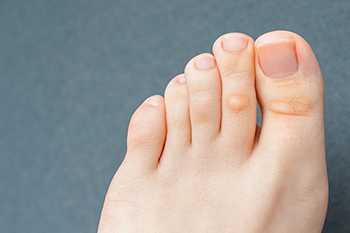
Corns can cause patients to have severe pain, despite their small size. They can develop as a result of excess friction, which generally happens from wearing shoes that do not fit correctly. A common area where a corn can be found in the side of the pinky toe. The pain can be so severe, that larger shoes may need to be purchased to lessen its severity. Corns that form between the toes are called soft corns, as they are consistently moist from the sweat that is found there. Some patients have corns that form on top of the toes, and this may be from an existing bunion or hammertoe. Patients who have small corns may find mild relief when the foot is soaked in warm water, followed by using a pumice stone that can wear the dead skin away. For more severe corns, it is suggested that a podiatrist be contacted, who can prescribe medicine that may shrink it, or possibly trim it surgically.
Corns can make walking very painful and should be treated immediately. If you have questions regarding your feet and ankles, contact Dr. Rouder of S.I. Podiatry. Our doctor will treat your foot and ankle needs.
Corns: What Are They? And How Do You Get Rid of Them?
Corns are thickened areas on the skin that can become painful. They are caused by excessive pressure and friction on the skin. Corns press into the deeper layers of the skin and are usually round in shape.
Ways to Prevent Corns
There are many ways to get rid of painful corns such as:
- Wearing properly fitting shoes that have been measured by a professional
- Wearing shoes that are not sharply pointed or have high heels
- Wearing only shoes that offer support
Treating Corns
Although most corns slowly disappear when the friction or pressure stops, this isn’t always the case. Consult with your podiatrist to determine the best treatment option for your case of corns.
If you have any questions please feel free to contact our office located in Staten Island, NY . We offer the newest diagnostic and treatment technologies for all your foot and ankle needs.
